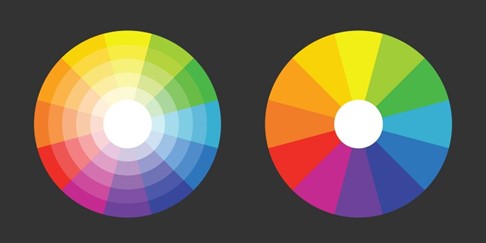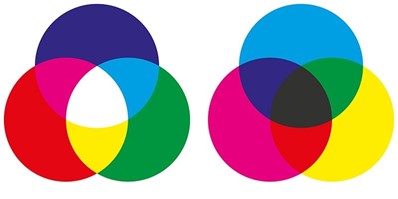FAS3-A1. For a whole colour and pattern
TIMING/LENGTH (IN MINUTES): 60’
DESCRIPTION
In the next didactic unit, we will go into the world of colours and prints, from a vision as objective as possible, so that we can use it in our search for innovation and adapt it to our business ideas.
DEVELOPMENT/ METHODOLOGY
LEARN
WHAT IS COLOUR?
Colour is the property possessed by an object of producing different sensations on the eye as a result of the way it reflects or emits light.
Colours can be classified as primary colours (cyan, magenta and yellow) or secondary colours (which arise thanks to the combination of the primary ones); for this we leave you with the chromatic circle, considering it as the colour wheel that represents in a graphic, ordered and circular way the colours visible by the human eye according to their shade or tone.

All colours have the following properties:
- Tint: also known as hue, it depends on the wavelengths.
- Saturation: known as colour purity, it has to do with the amount of colour present at the same time.
- Brightness: it depends on the amount of light that has the colour that makes it lighter or darker.
In the following links you can find more information about what colour is and the chromatic circle, which we highly recommend you to read in order to go deeper into the concepts.
COLOUR THEORY
We consider Colour Theory to be a set of basic rules that govern the mixing of colours to achieve the desired effects and tones. It is a very important principle in graphic design, painting, photography, television…
There is no single theory of colour, but rather a set of approaches to colour and its dynamics.
One of the main inputs of any colour theory is the colour circle we have talked about before.
We can find two main ways of combining colours within the Colour Theory, one additive and one subtractive:
- RGB model (additive).
- CMYK model (subtractive).

https://concepto.de/teoria-del-colour/
PANTONE
Pantone is a system for matching colours, used in specifying printing inks, read more about it visiting the link below:
https://blog.merchandise-essentials.com/what-are-pantone-colours
Also, you can have a look at Pantone Company through its website: https://www.pantone.com/
COLOUR PSYCHOLOGY
Colour psychology is the study of colours in relation to human behaviour. It aims to determine how colour affects our day to day decisions such as the items we buy, read more about it visiting the link below:
https://www.oberlo.com/blog/colour-psychology-colour-meanings
Colour therapy is an alternative therapy that uses colours and their frequencies to heal physical and emotional problems. Colour therapy is also known as chromotherapy or colour healing.
https://www.regain.us/advice/therapist/what-is-colour-therapy-what-is-it-for-and-is-it-right-for-me/
And the truth is that it does not sound strange to hear people say how colours influence them or affect their emotions; we usually talk about cold and warm colours, when deciding on a colour to paint your house it is something you take your time to think about.
COLOUR IN FASHION
Fashion is one of the areas that pays most attention to colours in an explicit way. Every year, predominant colours are proposed for the different seasons, and clothing brands follow these guidelines, so that to some extent the colour selected occupies your wardrobe almost unconsciously.
But in order for clothes to have these colours, they have to undergo a series of dyeing processes that generally involve the use of materials that are not very sustainable and that have a rather negative impact on the environment. A large amount of water is wasted in order to do this, a huge amount of chemicals is used which are passed on to the water and it is discarded.
Next, we invite you to read this article that talks about the problems of fabric dyeing beyond the climate and environmental impact:
https://www.vogue.es/moda/articulos/tintes-toxicos-ropa-problemas-contaminacion-industria-moda
In spite of that, we can make different types of handmade and ecological clothes dyes:
- Eco print: it consists of printing on the fabric fresh flowers or leaves by means of consecutive blows until the colour pigments of the same are printed on the fabric in question.
- Use of natural materials and products: raspberries for dyeing red, carrots or onion leaves for orange, lemon peels for yellow dyeing…
In the following links we leave you with different materials to be able to make dyes in a natural way, as well as using different dyeing techniques so that you get unique prints and designs.